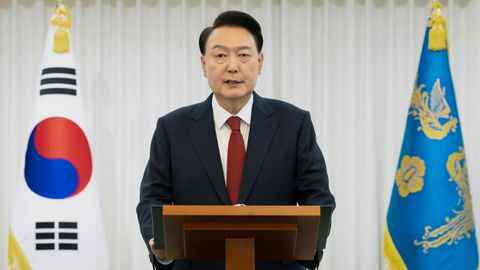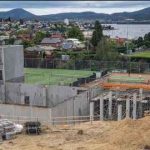Until the Constitutional Court determines whether to formally remove Yoon Suk-yeol from office or restore him, he will remain suspended.
As the Constitutional Court began its first hearing on South Korean President Yoon Suk-yeol’s case Monday to decide whether to remove or reinstate him from office, law enforcement officials are demanding to call the impeached leader for questioning regarding his brief martial law order.
As part of a larger investigation into whether Yoon’s misguided power grab constituted to rebellion, a joint investigative team comprising the Defense Ministry, police, and an anti-corruption agency said it intends to send a request to his office for him to come for interrogation on Wednesday.
The National Assembly, which is controlled by the opposition, impeached Yoon on Saturday for declaring martial law on December 3. Until the Constitutional Court makes a decision on whether to formally remove him from office or reinstall him, his presidential powers will be suspended. Within 60 days of Yoon’s dismissal, a national election must be held to select his replacement.
Yoon has defended the imposition of martial law as a necessary measure to combat the Democratic Party, the main liberal opposition party, which he refers to as “anti-state forces” that are impeding his goals. He has also pledged to “fight to the end” any attempts to remove him from power.
In recent days, hundreds of thousands of demonstrators have flocked to Seoul, the nation’s capital, demanding Yoon’s arrest and removal from office.
It’s still unclear if Yoon will agree to the investigators’ request for an interview. According to reports, Yoon was also summoned to come to a prosecution office on Sunday for questioning by South Korean prosecutors, who are pursuing a separate inquiry into the event, but he declined. Calls to a Seoul prosecutor’s office often went unanswered.
A police search for evidence in Yoon’s office has also been met with resistance from Yoon’s presidential security agency.
The request was made before to the Constitutional Court’s Monday hearing. The court has 180 days to make a decision. A court decision, however, might be rendered sooner, according to analysts.
Parliamentary removals
In the 2004 and 2016 legislative impeachments of former presidents, Roh Moo-hyun and Park Geun-hye, respectively, the court took 63 and 91 days to decide whether to reinstate Roh and fire Park.
Following Yoon’s surprise stunt, which paralyzed politics, stalled high-level diplomacy, and hindered efforts to revitalize a struggling economy, Prime Minister Han Duck-soo, who took over as the country’s acting leader after Yoon was impeached, and other government officials have attempted to reassure friends and markets.
Lee Jae-myung, the head of the Democratic Party, suggested a special council for policy coordination between the government and parliament and encouraged the Constitutional Court to make a decision on Yoon’s impeachment as soon as possible.
One of the leading candidates to succeed Yoon is Lee, a fiery politician who spearheaded a political onslaught against his administration. He narrowly lost to Yoon in the 2022 presidential election.
Separately, Yoon’s conservative People Power Party floor leader Kweon Seong-dong criticized Lee’s special council idea, stating that it is “not right” for the opposition party to behave in a similar manner as the ruling party.
There is now a severe division inside the party between Yoon’s supporters and his detractors as a result of his impeachment, which was approved in parliament by some of the MPs from his ruling People Power Party. Han Dong-hun, the chair of the PPP and a vocal opponent of Yoon’s martial law, announced his resignation on Monday.
“If martial law had not been lifted that night, a bloody incident could have erupted that morning between the citizens who would have taken to the streets and our young soldiers,” Han said at a press conference.
Yoon’s declaration of martial law on December 3, the first such measure in over 40 years, was reminiscent of an authoritarian regime the nation has not experienced since the 1980s. Hours later, parliament unanimously decided to revoke Yoon’s directive, forcing him to do so.
Yoon attempted to halt the vote by sending hundreds of troops and police officers to the parliament, but they left after the parliament refused his order. There was no significant violence.
Yoon has been accused of rebellion by opposition parties, who claim that a South Korean president can only impose martial law in times of war or other such circumstances and cannot halt the functioning of parliament even in those situations.






